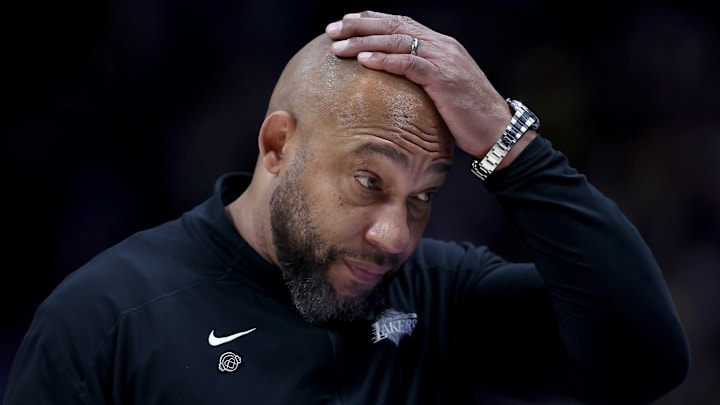The Los Angeles Lakers entered the 2024 NBA offseason with limited resources, but the ambition to make significant upgrades. Just one season after reaching the Western Conference Finals, that overhaul became necessitated by a 47-win season and a first-round exit.
Based on what the Lakers have and haven't done this summer, it's clear that general manager Rob Pelinka views the firing of Darvin Ham as the biggest upgrade he can manage.
The Lakers began the offseason with a bang, selecting SEC Player of the Year Dalton Knecht and former USC Trojans guard Bronny James at the 2024 NBA Draft. Los Angeles then re-signed Max Christie to a four-year, $32 million contract.
The latter decision is where the philosophy in Los Angeles began to show, as Christie is viewed in a far more positive light by the front office than, perhaps, Ham.
An average of $8 million per season isn't exactly break-the-cap money, but it's a stark contrast to how Christie's been valued in terms of playing time. In two seasons, both under Ham, Christie averaged 13.5 minutes per game—reaching a paltry career-high of 14.1 in 2023-24.
There's a case to be made that he wasn't a structural fit, but his 37.8 percent shooting from beyond the arc certainly implies he could've helped a team that ranked No. 24 in three-point field goals made.
Darvin Ham: Scapegoat or source of Lakers' inconsistency?
The Lakers' shooting woes seem to have informed a vast majority of decisions thus far—and they all point back to Ham. Knecht, for instance, was widely regarded as one of the best three-point shooters in the 2024 NBA Draft.
He's more of a three-level scorer than a spot-up shooter, but that emphasis on three-point shooting speaks to perhaps the most unsettling flaw from Ham's tenure.
In 2023-24, Los Angeles ranked No. 28 in the NBA in three-point field goal attempts. The optimistic take would be that the Lakers struggled to convert shots from beyond the arc and thus shifted the strategy to an approach that fit their strengths and weaknesses.
The reality, however, is that the Lakers ranked No. 8 in the NBA in three-point field goal percentage—meaning they were among the league's elite in efficiency, but chose not to shoot the long ball.
The Boston Celtics, meanwhile, just won a championship while ranking No. 1 in the Association in three-point field goals made and attempted. The Dallas Mavericks, which won the Western Conference and battled the Celtics in the NBA Finals, finished No. 3 in conversions and No. 2 in attempts.
The Minnesota Timberwolves won 56 games and reached the Western Conference Finals while ranking 23rd in attempts, but still ranked No. 15 in makes—and played vastly superior defense.
There was a time when being efficient from beyond the arc was enough to permit scarce use of the outside shot. That day has passed, however, as the teams that can shoot the three are consistently at their best when they embrace that ability.
Unfortunately, the Lakers were their own worst enemy as they squandered the best shooting season of LeBron James' career by overlooking one of their greatest offensive strengths.
Lakers' strategy is to deviate from Darvin Ham's path
In response to their flawed approach to the 2023-24 season, the Lakers have openly discussed the need to embrace the outside shot. New head coach JJ Redick has bluntly stated that Los Angeles will shoot more threes this coming season.
It's what hasn't been said or done, however, that may be the most damning of all in terms of who Pelinka and the Lakers blame for their failures in 2023-24.
Los Angeles was always going to have trouble altering the roster with such limited cap space. Even still, the fact that Pelinka has yet to sign a single player or execute a trade of any kind points the finger directly at Ham as far as the Lakers' shortcomings are concerned.
That isn't to say that Pelinka is right to think the way he does, but it's clear that the Lakers feel they're a far better team than what Ham helped them show.
This only increases the pressure on Redick, a first-year head coach, to raise the team's ceiling. He'll be tasked with learning from Ham's perceived mistakes and creating solutions to enhance the quality of play with a team that's experienced polarizing success over the past two seasons.
It's a dangerous game that Pelinka is playing, but it's become abundantly clear that the Lakers view Ham as the reason they were unable to contend a season ago.
